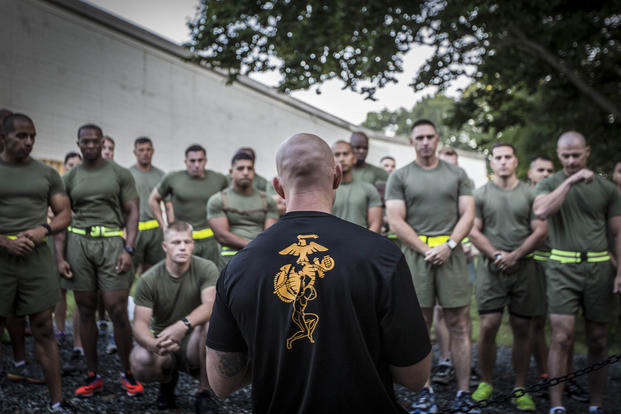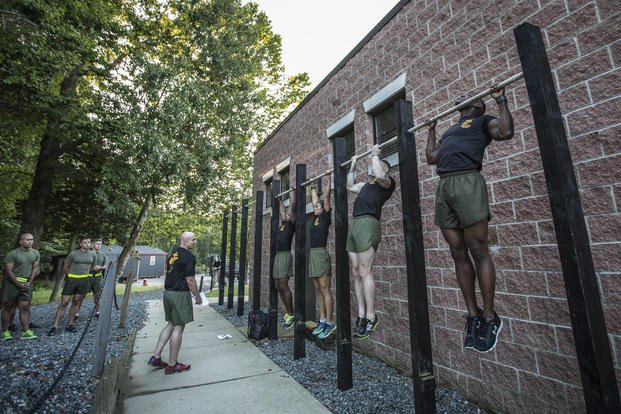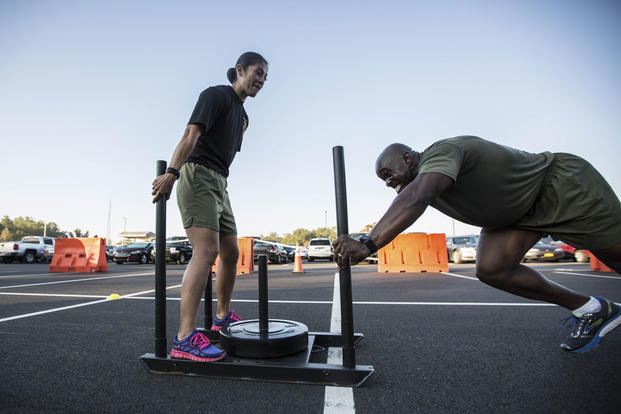The Marine Corps prides itself on being the leanest and toughest of the fighting forces. But as force fitness instructors join units throughout the fleet for the first time, they're hoping to show Marines a different, less severe side of fitness.
The Corps will graduate its first class of 43 force fitness instructors Nov. 4 after a five-week program of instruction at Marine Corps Base Quantico, Virginia.
The instructors are noncommissioned officers who will carry a brand-new additional military occupational specialty, 0919, and advise unit commanding officers and troops on complete fitness, including nutrition and injury prevention.
The program, launched in response to a mandate from Marine Corps Commandant Gen. Robert Neller, comes as the entire Marine Corps overhauls its physical fitness and combat fitness tests and as the first female Marines pursue infantry jobs in the fleet.
The first job for the new instructors, however, may be changing the mindset for Marines around fitness.
When Marine recruits enter boot camp, physical exercise, or 'incentive training,' is used as punishment and correction to harden them and prepare them for the rigors of service, Staff Sgt. Beau Hancock, an instructor at the Quantico fitness instructor class told Military.com in an interview. The problem, he said, comes when Marines retain that negative mentality of exercise as punishment after they enter the fleet.
"They need to break that once they get out of boot camp, that PT isn't because I have to; it's because I want to," Hancock said. "If I negatively reinforce someone over and over again, it's going to break someone down."
Hancock, an infantry unit leader who spends off-duty time as a fitness coach and a youth mentor, said this out-of-uniform experience informs how he trains the new fitness instructors.
It's more to that coaching aspect, less of telling or yelling," he said. "So Marines across the board want to do it; they want to be in shape."
And while the Marine Corps has the lowest percentage of overweight troops of any of the armed forces, that doesn't mean the average Marine eats well. A diet heavy in pizza and energy drinks is not uncommon for grunts who burn huge numbers of calories in training and field exercises, but far from optimal for complete fitness.
"We decided, the number one thing Marines fail, where they all fall short is on the nutrition side of the house," said Gunnery Sgt. Dimyas Perdue, the course's head instructor. "That was going to be the number one thing that we were going to preach: performance nutrition, how to fuel your body for performance activity, how you fuel your body in a combat environment when you're on patrol."
Gunnery Sgt. Michael Wilson, a fitness instructor in training who currently works as an infantry unit leader assigned to 2nd Marine Logistics Group, said the instructors will be able to help Marines stay fit, even if they're working grueling shifts, by using tailor-made quick workouts with warm-ups built in.
"The mindset of physical fitness, sometimes it's seen as a negative thing. But I think we need to see it as a positive thing," he said. "Instilling in the person a positive attitude about physical fitness in general."
For Staff Sgt. Alicia Hawkins, a drill instructor based at Marine Corps Recruit Depot Parris Island, South Carolina, who is also in training to become a fitness instructor, the course was helpful in providing additional tools to adapt workouts to Marines' performance and injury levels, with tools ranging from sand bags and medicine balls to physical body resistance.
She also looks forward to working with female Marines who need to complete pull-ups to max the physical fitness test under new requirements, using tools like flex bands and negative reps.
"There's never going to be a reason why we can't work out," she said.
It may not be a kinder, gentler physical fitness culture, but it's one that will force Marines to re-think what it means to be tough.
"Yoga is a bad thing to the studs," Perdue said, "but that's something we can do to ensure our body is ready."
-- Hope Hodge Seck can be reached at hope.seck@military.com. Follow her on Twitter at @HopeSeck.































